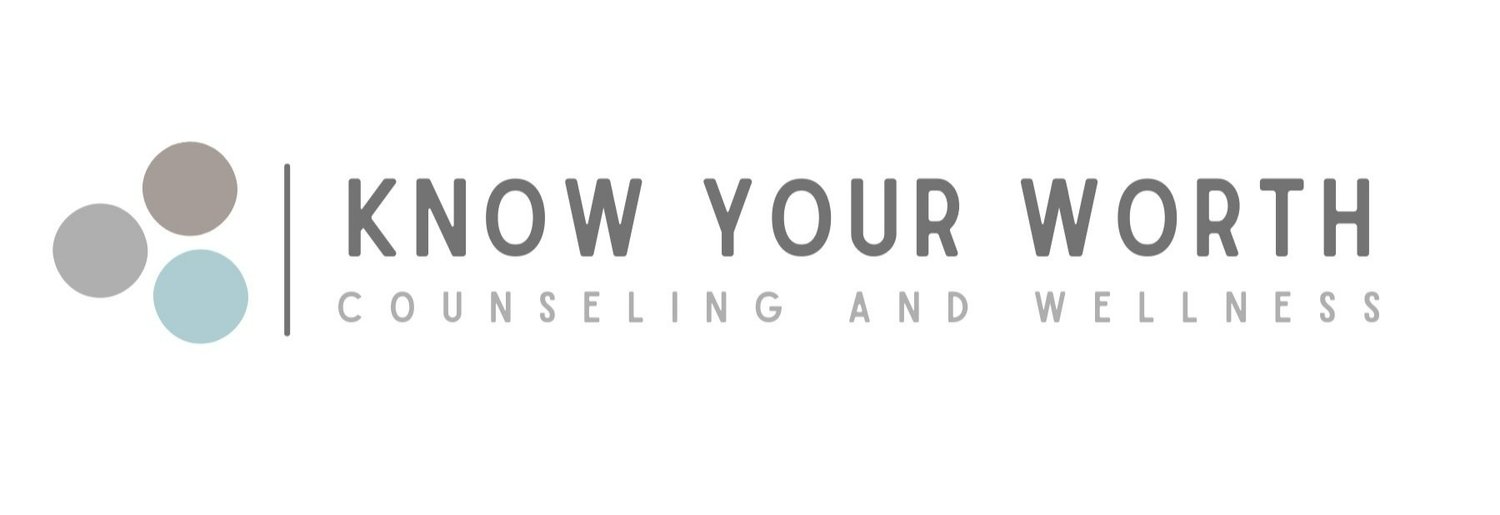Medication vs. Therapy: Which Is Right for You?
When it comes to mental health, figuring out the right approach can feel overwhelming. Some people jump straight to medication, while others swear by therapy. Each option has its benefits, and sometimes the best results come from combining both. Understanding how they work and what fits your needs can make a huge difference in your recovery and overall well-being.
In this article, we’ll break down the differences between medication and therapy. You’ll learn what each approach offers, the benefits and limitations, and how to decide which path or combination might be the best fit for your mental health needs.
What Is Therapy?
Therapy, also called psychotherapy or talk therapy, involves meeting with a licensed mental health counselor to explore your thoughts, feelings, and behaviors. At Know Your Worth Counseling, our therapists help you identify patterns that may be affecting your mental health and guide you in building strategies to cope, grow, and feel more in control.
How It Works: Therapy focuses on understanding behavior and thought patterns. You work with your therapist to develop coping skills, improve self-awareness, and make positive changes.
Common Types: Cognitive behavioral therapy (CBT), dialectical behavior therapy (DBT), interpersonal therapy, mindfulness-based therapy, and others.
Who It Helps: Therapy can benefit anyone seeking to gain a deeper understanding of themselves, develop new coping strategies, or address mild to moderate mental health concerns.
Benefits of Therapy
Therapy offers tools for lasting emotional growth. Some of the main benefits include:
Identifying and exploring underlying issues
Learning coping strategies for daily life
Improving self-awareness and emotional regulation
Building resilience and confidence
Recognizing early warning signs in a safe, supportive space
What Is Medication?
Medication is prescribed by a licensed Psychiatric Mental Health Nurse Practitioner. Medication management involves prescribed drugs that target mental health symptoms by influencing brain chemistry. This can help regulate mood, reduce anxiety, or improve focus and concentration.
At Know Your Worth Counseling, Dr. Prezeela Mathew, PMHNP-BC, provides medication management for clients 10 and older. Medication works by balancing brain chemistry, reducing symptoms, and often making it easier to engage in therapy.
How It Works: Mental health medications adjust chemicals in the brain, such as serotonin, dopamine, or norepinephrine, to improve mood, reduce anxiety, or manage other symptoms.
Common Uses: Medication is often used for conditions like anxiety, depression, ADHD, bipolar disorder, OCD, and more.
Who It Helps: Those with moderate to severe symptoms or conditions that affect daily life may benefit from medication.
Benefits of Medication
Medication can offer relief and support daily functioning. Key benefits include:
Reducing or stabilizing symptoms
Supporting therapy by making symptoms more manageable
Improving the overall quality of life
Offering faster relief for severe or persistent conditions
Therapy vs Medication: How They Differ
Here’s a simple comparison to see how they differ:
Some people benefit from therapy alone. Others need medication first to manage symptoms before therapy is effective. Many find combining the two provides the most support.
How Do Medication and Therapy Work Together?
Therapy and medication often work best together. For example:
Someone with severe depression may feel too low to benefit from therapy without medication support.
Trauma survivors may stabilize with medication, then process emotions through EMDR therapy or other therapy.
ADHD or anxiety can sometimes require both medication for focus and therapy for coping strategies.
At Know Your Worth, we integrate CBT, mindfulness, and psychiatric care to provide clients with a comprehensive approach that supports emotional and mental wellness.
How to Decide What’s Right for You
Before deciding between therapy vs. medication, talk with your healthcare provider.
Think about:
The type of mental health condition you have
How severe your symptoms are
Your daily routine and lifestyle
Which treatment feels right for you
Costs and your insurance coverage
Benefits and risks of each option
Any past treatments you’ve tried
The answers will help you make a choice that fits your life. A licensed provider can assess your needs and recommend therapy, medication, or both.
Final Thoughts
Both medication and therapy can help you feel better, and choosing one, the other, or both depends on your needs and preferences. Medication can relieve severe or disruptive symptoms quickly, while therapy teaches skills that last long after sessions end. Select the option that feels right for you and fits your current situation, and know that it’s okay to adjust your approach if something isn’t working. Every step you take helps you learn more about yourself and moves you closer to recovery.
Find the Right Support: Therapy, Medication, or Both
At Know Your Worth Counseling, we help you explore whether therapy, medication, or a combination is best for your mental health. Our team of experts supports you every step of the way.
Schedule a consultation today to discover the approach that best suits you.
FAQs
Can therapy alone help with severe depression?
It can help, but progress may be slower. Severe symptoms often respond better when combined with medication.
How long does medication take to work?
It depends on the type. Some people notice changes in days, others in a few weeks. Monitoring by a provider ensures safety.
Is it safe to use therapy and medication together?
Yes. Combining both is common and often the most effective way to manage symptoms.
Are there side effects with therapy or medication?
Therapy doesn’t have side effects. Medication may cause side effects, which your provider will monitor and manage.
Can I stop medication once therapy starts?
A provider should always guide changes. Therapy alone may be enough for some, but not everyone.





